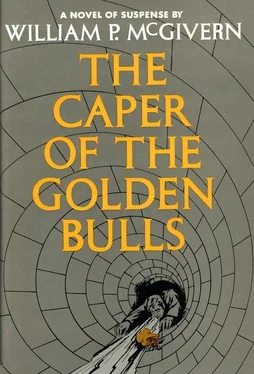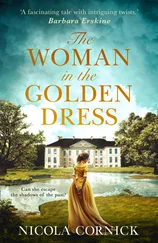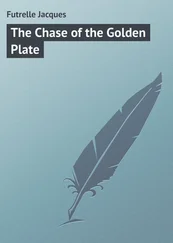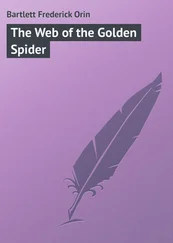Peter’s patience was at an end; he swung hard and savagely, one, two, three times, and the sounds of his fists landing were like the sound of pile drivers slamming into hard-packed earth.
He jumped on his fallen foe, but the man laughed and struck him in the stomach with a blow that caused the air to burst from his lungs.
Peter got a grip on his throat and prepared to kill him.
“Stop it! Stop it, you fools!”
Dazed, stupefied, gasping for breath, Peter turned and stared blearily in the direction of that marvellously familiar voice.
The outdoor lights were shining, flooding the gardens and the terrace.
They gleamed in Grace’s eyes, gleamed in her golden hair, as she towered above him on the terrace like a splendid angry statue. At her side was a small round man with a bald head and shy eyes. Shock streaked through Peter like bolts of electricity.
He stared incredulously at the man he was sitting on, at the hawk-faced man he had been trying to kill; his head reeled; the tugs of reason strained at their moorings.
“No,” he gasped weakly.
“I got here ahead of them, so I thought I’d take a look around. Lucky they arrived in time, eh?”
“Paddy, I might have killed you!”
“Ah, you old bastard,” the Irishman said smiling. “It’s good to see you, lad, even if you are choking the life out of me. Let me up now. This calls for stronger waters than you’ve got in that bloody fishpond.”
Peter rolled off the Irishman and lay flat on his back, more spent and helpless than he had ever been in his life, while all the bright stars revolved about him in wild derisive circles.
“Let me give you a hand, lad.”
“Easy now, you’re all right,” he heard Bendell say gently.
“Oh, darling, you do need a drink,” said Grace.
Tenderly and gently, they took him up the stairs and into the villa.
The sound of the engine trembled on the night air, diminishing and fading as the car followed the curving road down the mountains to the coastal highway. When the sound died away and only the wind stirred the silence, Peter sighed unhappily, for he felt very weary then, and very much alone.
“Oh, you’re such a stubborn man,” Grace said. “Worse than that, you’re wilful and selfish. You don’t care a bit about your old friends. Or about me. How could you send them away, Peter?”
“Do you imagine it was easy?” He couldn’t keep a trace of bitterness from his voice. “Don’t you realise how much I’d like them with me? And how much I need them?”
Grace touched her eye with a handkerchief. “When I found Mr. Bendell in Liege, he was overjoyed at the chance to help you. But he felt you’d balk at using Canalli. That’s the only reason we didn’t send for him. They didn’t dream you’d turn them down, Peter.”
It had not been easy, he thought sadly. He had told Bendell and the Irishman that there was no place for them in his plans, and they had had to take his word for it. But the Irishman, his eyes bright and hard as diamonds, had said, “Just one question, lad. Is the little bitch forcing you into this? Has that black hearted harpy got something on you?”
“No, of course not.”
“Peter!”
“Grace, keep out of this.”
“What is it, lad? Give us a straight answer, for the love of Mary. Has that rotten God-blasted bitch, Angela, got you where the hairs are short?”
“No.”
Bendell had sighed and said: “Peter, my instincts tell me you are being noble.”
“You should know me better than that.”
“I do know you, Peter. I know you are generous and loyal beyond the boundaries of simple sanity. But as it was in the past, so it shall be now. You led and the rest of us followed. If you truly don’t need us, Peter, we will go. Our presence here would only be dangerous to you.”
“I truly don’t need you, old friends.”
They had sighed and raised their glasses to him in a last salute.
Now they were gone. Even the sound of the car had died away in the windy mountains.
Grace walked to the bar at the end of the long living-room, and there was a suggestion of defiance in the decisive tap of her high heels on the cold marble floor. “I have a good notion to get drunk.” She wore a black suede dress and black nylons, and her body seemed to merge with the shadows; in Peter’s fancy, her bright face shone through the gloom like a glorious star mounted on a pedestal of exquisitely wrought ebony. “I should have told them the truth,” she said, splashing whisky recklessly into a cut-glass tumbler. “Yes. I should have told them about Angela and the film. And that you’re risking your life to keep them safe and free.”
“I’m very grateful you didn’t.”
“It was cruel not to. How do you imagine they’ll feel when they learn the truth? When they pick up a newspaper one morning and find that you’ve been shot and killed? Or are in prison?”
“Damn it, they’re not going to learn the truth. Stop worrying about me. I should think you’d have plenty to do just worrying about yourself?”
“What do you mean by that?”
Peter took the Ace of Diamonds from his pocket. It was quite soggy from his dunking in the lily pond; the gryphon’s head was streaked and blurred almost beyond recognition. “Let’s talk about you now,” he said. “I became a thief for what may have been a ridiculous reason, but my motives were serious and honourable. What excuse did you have?”
“I didn’t have any excuse. I didn’t need one.”
“There. That’s something to worry about.”
“Oh! What a moral snob you are! You look at me in disdain because I didn’t have a nice, sentimental justification for stealing things. Supposing I told you I accidentally set off a landslide that wiped out a convent? And that I stole money so the nuns could rebuild it? Would that make you feel better?”
“Grace! Is that true?”
“Of course not, you silly man. I don’t boast about what I did. But I don’t apologise for it.”
“Then you are simply an amoral criminal. I don’t see anything cute or funny about that.”
“I wish you wouldn’t be so unhappy about it. Does it really mean that much to you?”
Peter slumped into a sofa and put his sodden shoes up on a coffee table. “Yes,” he said gloomily. “It means everything.”
Unexpectedly her mood changed; she smiled gently and tremulously, and sat beside him. She kissed his cheek and put her head against his shoulder. “Do you know why I love you so much? It’s because you care about my soul. You’d like it to be as fair as my body, wouldn’t you?”
She turned her head and kissed the corner of his mouth. “As fresh and fragrant as a bowl of spring roses. I’d do anything to please you, Peter. But I can’t do anything about my soul. I mean, I can’t get at it with a pail and scrub brush. Would you like to hear the story of my life?”
“Would it be the truth?”
“I suppose you have a right to be beastly. I did lie to you once. But I won’t now. My father died when I was a little girl. My mother remarried a few years later. He was a jolly little man with waxed moustaches and cheeks like apples. I loved him very much. Paul travelled a lot and when he came home he always brought me presents. Combs, mirrors, hair bows boxes of candy, dresses with lots of petticoats. When I learned, much later, of course, that he was a thief, it didn’t really make any difference to me. Paul never hurt anyone in his life. He would have fainted away at the notion of carrying a knife or a gun. And he only stole from the rich, of course.”
“That’s because the rich have the money. Robin Hood figured that out, too.”
She smiled and tilted her head to one side. “Now you sound more like yourself, darling. Anyway, Paul got old and couldn’t work, and we became poor. There were various uncles and aunts living with us by then, and the pinch was uncomfortable. It was very hard on Paul! He sat in the garden sighing over the past, and planning jobs just to keep busy, the way some people do crossword puzzles. The plans were so clever it seemed a pity not to use them. So I used them. It seemed quite normal, like carrying on the family business.”
Читать дальше












